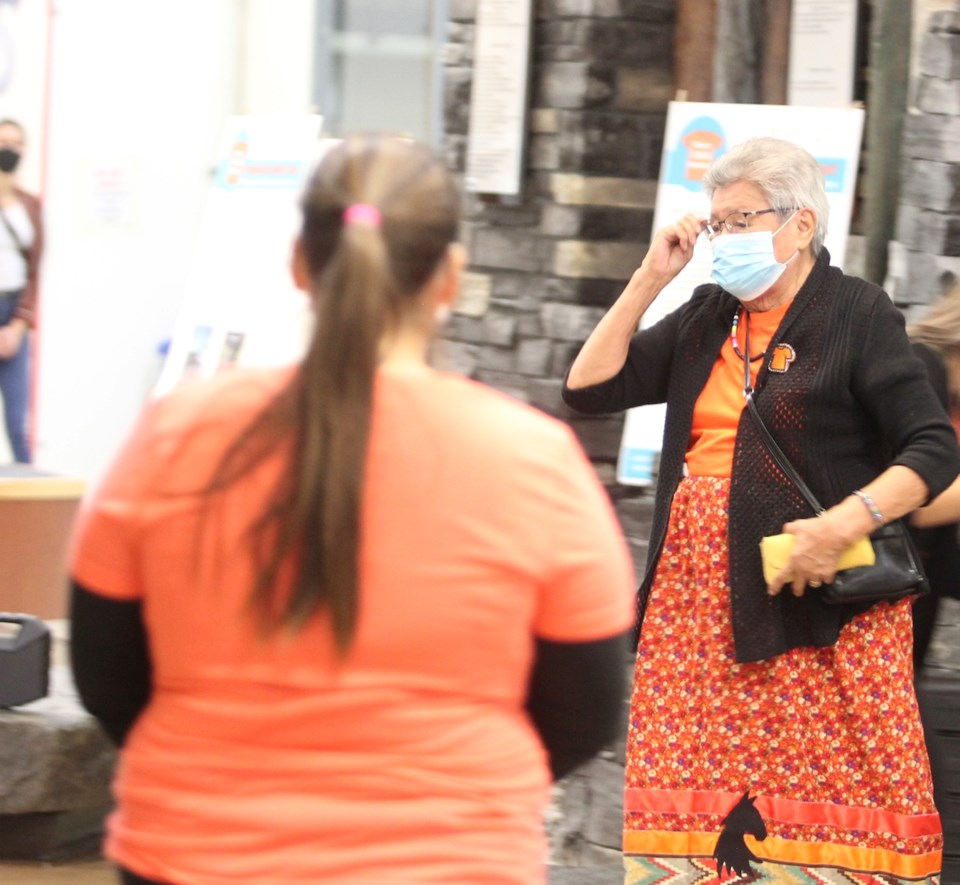LAC LA BICHE - Emma Rayko is a survivor.
In her orange shirt, the Indigenous elder stood out — and then stood up —to speak at last week's Orange Shirt Day event at the Bold Center in Lac La Biche.
Reduced in size due to COVID-19 precautions this year, the small event was part of a nation-wide campaign that draws awareness to the history of Canadian residential school system. The event has been held annually since 2013. Despite the reduced sizes of the this year's September 30 events, they carry a massive message.
"I am a survivor from residential school," Rayko told Lakeland This Week after giving the opening prayer at the event organized by the Lac La Biche Canadian Native Friendship Centre and the municipality's Family and Community Support Services last Wednesday morning.
Rayko spent eight years at the Poundmaker's Residential School near St. Albert.
"I lived that. For eight years I suffered in that damn school," she said, explaining the fears she spent due to the unexplained torment by teachers and officials.
"You suffer in those schools.... for no reason. You are waling in the hallway, and one staff member is standing there — you are not doing nothing and you get slapped for nothing, and you don't understand," she said, remembering worse punishments, but keeping them to herself.
For years after her residential school experiences, she did that. Kept it all inside.
"After I got married, I never thought about it. I tried to live a good life with my kids, with my family," she said.
But on June 11, 2008 it all came back. She was making bread in her home. She was alone and had the TV on. She heard that then Canadian Prime Minster Stephen Harper was planning a nation-wide television event to apologize on behalf of the Canadian government for the treatment of Indigenous people in residential schools.
"I thought I'd just sit down and watch what he was going to say," Rayko recalled. "... when he opened his mouth and started talking about it.... I couldn't control myself. I was back there. Everything was coming back."
What came back, in a flood of tears and emotion were the sight, sounds, smells and feelings. She remembers the sounds of her young cousins being taken by a federal Indian Agent, pulled from the arms of her mother's sister to go to the Blue Quills Residential School near St. Paul.
"I was so young, but I remember that. I remember the crying," said Rayko, saying that soon after, the cries were closer to home as the RCMP and an Indian Agent came her her own family's farm.
Initially asking about the numbers of cattle and grain crops being grown on the farm, Rayko said she remembers her dad telling the agent to leave, telling them it was none of their business. But then her dad was told that his children weren't allowed to attend a "white school" anymore and would have to go to a residential school. Again, she remember her dad arguing. But the men used the law to force him to make a heart-breaking decision.
"'One of your children will go to residential school — You will have to tell us which one' Rayko recalls her dad being told, "Or else they would just come and take the kids. There was five of us."
Reluctantly, her dad said her name.
"They said Emma.....and the next day I was gone," she said.
The next eight years will never leave her thoughts.
"The hardest time for me was Christmas time, she said, explaining that the school offered nothing festive — just the continuing fear. "Nothing changed, not even a tree."
Decades later, despite Truth and Reconciliation, the prime minister's apology and the increased awareness, Rayko says the pain is just as strong as it was when she was a child. She wears the orange shirt and speaks sometimes at events about her experience — but the figurative scar that residential schools are said have left on the history of Canada are also actual mental and physical scars on thousands of survivors.
Asked if she feels any better about the experiences because of the attention, the Elder slowly shakes her head.
"I don't think so. It might not be as bad — but never better. Maybe a little — but not much. You can't change the past."
The residential school system was in effect across Canada from the late 1800s up to the mid 1990s. The Lac La Biche Mission is one of the locations listed as a residential school by the Commission that was tasked with exploring compensation and healing for survivors. The Mission's government-funded residential school was in operation from 1893 to 1898 before the federal government's mandate over Indigenous student learning was moved to the Blue Quills Residential School near St. Paul. The Mission site continued to host a schoolhouse run by the Catholic Church until the 1970s. The Poundmaker's residential school operated near St. Albert from 1924 to 1968. The last federally-operated residential school to close was Gordon's Indian Residential school in Saskatchewan. It closed in 1996.
An estimated 150,000 Indigenous children were taken to one of Canada's 140 residential schools during their 100-plus year history.


